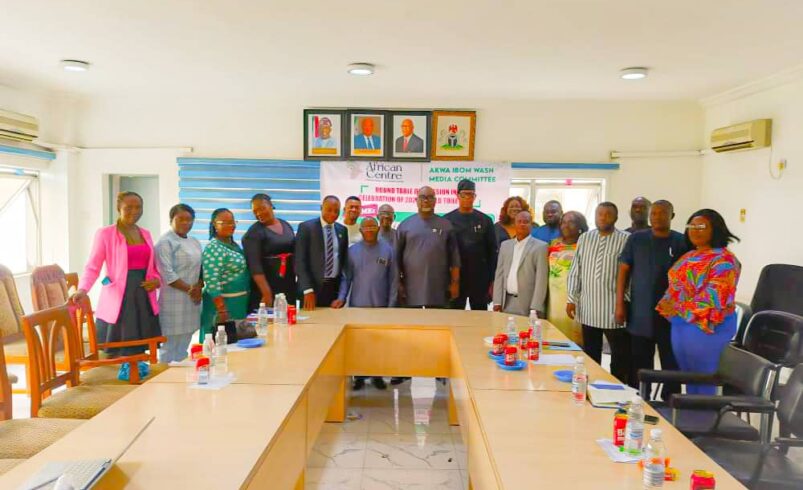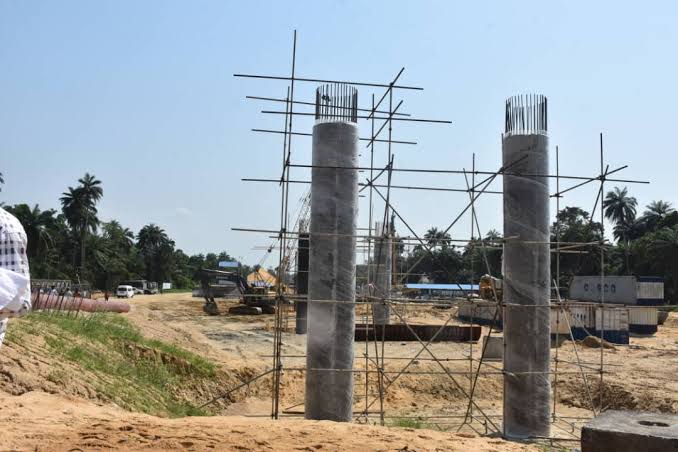By Princess Don, Uyo.
In a renewed push to safeguard public health and protect the environment, the Akwa Ibom State Government has announced a comprehensive sanitation plan aimed at curbing open defecation and strengthening hygiene practices across the state.
The initiative, tagged “Keep Akwa Ibom Clean,” was unveiled at a roundtable discussion themed “Sanitation as Our Collective Responsibility,” organized by African Human Development Center in collaboration with Ibom WASH Media Committee as part of activities marking World Toilet Day 2025, yesterday.
Speaking, the Commissioner for Water Resources and Sanitation, Dr. Ubuo Ubuo, described poor sanitation as one of the most persistent drivers of disease outbreaks, groundwater contamination, and environmental degradation in the state.
According to the Commissioner, the “Keep Akwa Ibom Clean” project will serve as a major health-focused intervention targeting waste management, household hygiene, and the reduction of sanitation-related illnesses.
He emphasized that preventing open defecation will help reduce incidences of diarrhea, cholera, dysentery, and other waterborne diseases conditions that remain leading causes of mortality in low-sanitation communities.
Dr. Ubuo further praised Governor Umo Eno for approving the construction of new sanitary facilities in Obot Akara, Ikono, Esit Eket, and Nsit Ubium. The facilities, he noted, will play a vital role in providing safe toilet access and reducing contamination of water sources.
According to him, “Environmental health is the foundation of a productive society, and sanitation is at its core.”
In his remarks, the Managing Director of Ibom Water Company, Engr. Edo Etuk, underscored the strong link between clean water, sanitation, and disease prevention.
He warned that without proper sanitation infrastructure and behavioral change, water contamination could undermine public health gains. He affirmed the company’s commitment to supporting interventions that improve safe water access while reducing exposure to harmful pathogens.
The General Manager of the Akwa Ibom Rural Water Supply and Sanitation Agency (AK-RUWATSAN), Mr. Saviour Udoh, also highlighted the environmental dangers of open defecation.
He explained that faecal waste left in the open contributes to pollution of soil, rivers, and streams, eventually affecting agricultural productivity and community health. He called for stronger community participation, noting that sanitation cannot be achieved through government effort alone.
Earlier, the CEO of the African Human Development Center, Prof. Gabriel Umoh, emphasized the global implications of unsafe sanitation, citing statistics that 3.4 billion people still lack access to safely managed sanitation.
He stressed that as climate patterns shift and populations grow, improved sanitation will become even more critical to preventing disease outbreaks and protecting vulnerable communities.
The roundtable also featured a paper presentation by journalist Ekemini Simon, who examined the challenges of delivering sustainable sanitation in Akwa Ibom amid declining donor support.
He noted that domestic resource mobilization, stronger policy implementation, and public participation will be crucial in closing sanitation gaps.
In her vote of thanks, Theresa Donatus, an ethicist and Secretary of the Ibom WASH Media Committee, appreciated all participants for their active engagement and meaningful contributions. She encouraged residents to embrace positive behavioural change, noting that sustainable sanitation begins with individual responsibility.
She further appealed to the state government to continue prioritizing sanitation, emphasizing that improved sanitation safeguards the health of the greatest number of people and aligns directly with the United Nations Sustainable Development Goals (SDGs).













